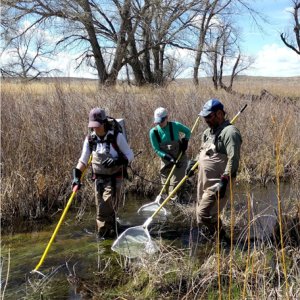Looking for fieldwork experience in ecology? Work for NEON
November 14, 2019
It's that time again. Each year, NEON hires hundreds of temporary field scientists to assist our full-time field operations staff with fieldwork. NEON field sites are located in 24 states across the U.S plus Puerto Rico; and the sites are located in some of the nation’s most pristine and wild areas. These opportunities are perfect for up and coming scientists who want valuable field work experience collecting data for a continental-scale ecology project. These positions typically run from May to September. Some locations require an early start date and later end date, exact dates vary by location.
Make a difference and learn a lot
The days will be long and the work may be rigorous including hiking in tough terrain, but the work will be interesting, meaningful and fun and you will be immersed in nature. Depending on your experience and background, you may become a fauna, flora or aquatic technician. Either way, you will learn how to use GPS navigation systems for locating, measuring and marking plots; and/or placing and setting traps; as well as lab activities.
In the field:
- Fauna technicians conduct the following protocols: beetles, ticks, mosquitoes, soil collection and mammal trapping
- Flora technicians conduct the following protocols: plant phenology, plant diversity, herbaceous biomass collections, below-ground biomass, litterfall, canopy foliage, vegetation structure and coarse downed wood
- Aquatic technicians conduct the following protocols: Surface water chemistry, dissolved gases, isotopes, aquatic microbes, groundwater chemistry, discharge, reaeration, aquatic plants, invertebrates/zooplankton, algae, benthic microbes, sediment chemistry, geomorphology/bathymetry, fish electroshocking and riparian habitat assessment
Laboratory activities include:
- Sample processing and shipment
- Operate laboratory equipment (i.e. drying oven, analytical balance)
- Data entry and QA/QC
- Fieldwork preparation and cleanup
Field technicians may also be given the opportunity to help maintain field site instrumentation which may include calibrating sensors, troubleshooting problems, site maintenance, and assisting full time Instrumentation Technicians with corrective maintenance of sensors. Ideal candidates would have some experience with using instruments in the laboratory or field, mechanical mind-set, and most importantly the willingness to learn.

Collage of field technicians working the field
A stepping stone in your scientific career
Temporary field scientist positions are an excellent way to explore ecological science hands-on, gain a network of other early career scientists and make a difference. Here are just some of the benefits:
- Get complete training of protocols and procedures
- Gain experience doing field observations, sample collection and lab work using a wide variety of field ecology protocols to help you hone your science career interests
- Live and work in some of the most beautiful places in the nation
- Work alongside other early career ecologists/scientists; get great networking opportunities for your future
- Learning this work can provide a stepping stone into other NEON career opportunities
- Make a difference! The data you collect will be used by researchers, policy makers, etc. to better understand how our nation’s ecosystems function and change over time
Who should consider applying
- Recent graduates in wildlife biology, botany, forestry, range management, soil sciences, entomology, aquatic sciences are preferred but not required.
- You’ve taken a minimum of one course, preferably with laboratory, in botany, plant taxonomy, mammalogy, soils, entomology, ecology, limnology and want early career ecology experience.
- You’re a team player; good attitude; ability to hike long distances over difficult terrain in all weather conditions; willingness to learn; ability to function independently in the field as part of a 2-person team; ability to follow/execute written instructions/protocols independently; willingness to work 10+ hrs/day; willingness to work early mornings, late nights, and over weekends.
- You’re seeking adventures in the wilderness with close knit group of people and don’t want to spend 40 hours a week in an office, sitting at a desk.
